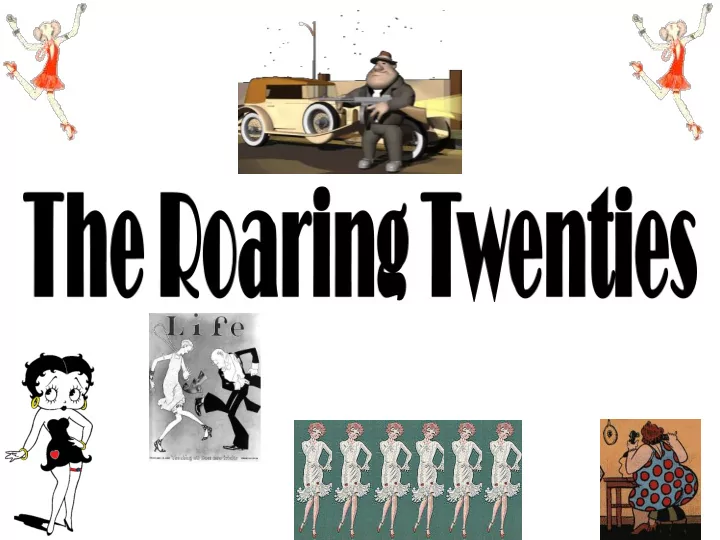

Notes by your peers separated by movie clips, music, and cartoons!!
Significance: The Flapper Many women felt freer to • Flapper - Brash women who experiment wore short skirts, cut their with bolder styles and hair, wore make up, listened manners to jazz, breaking social norms
Automotive Significance: Increase production & • Mass Production – faster, more advance efficient means of producing economy identical products people buying on credit & • Henry Ford – mass produced the Henry Ford regarding the Model T, installment Model T (automobile) – makes it plans “You can buy any one you want…so long as its black” affordable to everyday Americans • Assembly Line – a means of production in which the product is on an conveyor belt and assembled piece by piece
Mass Media • The Jazz Singer – first Significance: Increase movie with communication, sound create national • Talkies – unity/culture movies with sound • NBC – (National Broadcasting Company) national radio station
Hate Groups Significance: Discrimination prevails – we’re not • Knights of Mary Phagan – progressing lynched Leo Frank (Jew) in racially as a Marietta, part of the recreation of nation. the KKK • KKK – white supremacist group – terrorize anyone who is NOT white and protestant • Red Summer – race riots break out in 25 cities after WWI
Prohibition Significance: Causes crime / • 18 th Amendment – illegal activity - Gangs control prohibition of alcohol the cities • Speakeasies – illegal bar where you can buy alcohol • Al Capone – notorious gangster who is going to profit from prohibition
Immigration Significance: Fear of communism • Communism – gov’t system immigrant where the gov’t owns everything, discrimination & restrictions and everyone shares (anti- capitalism) • Sacco and Vanzzetti – known Italian-born radicals, Mass. court convicted them of robbery & murder, case somewhat shaky in court, sentenced to death • Red Scare – people are afraid of the spread of communism
Jazz Age Significance: New cultural • improvisation - spontaneous expression, reduce racial ("on the fly“) composing music tension • Louis Armstrong – famous jazz trumpeter, becomes a leader in the jazz movement • Cotton Club – club for white people to see jazz singers, brings AA culture into mainstream America
Harlem Renaissance Significance: Develop of AA • Harlem Renaissance – home culture, encourage to AA literary awakening black pride • Langston Hughes – poet of Harlem, wrote about the good and bad of AA lives • The New Negro – book written by Alain Locke, celebrate AA culture
Popular Music • Irving Berlin – song writer who made a new kind of music that changes Significance: America ( I’m dreaming of a white Development Christmas & Anything you can do I of American can do better ) culture / unity • Tin Pan Alley – producers of jazz music, birthplace of American popular music • Charleston- new dance, with beats of popular ragtime music
Presidential Policy Contributing to U.S. Prosperity Warren Harding (1921-23) His promise was a "return to normality". He reduced taxes to give businesses more money to grow and to put more money in the pockets of ordinary Americans. Harding was pro business, anti tax, anti regulation. In 1922, he introduced the Fordney-McCumber Tariff Act which imposed a tax on goods from foreign countries. This made foreign goods more expensive than domestic goods, and so this encouraged Americans to buy American goods only. The name for this policy was protectionism. Calvin Coolidge (1923-29) "Business is America's business," said Calvin Coolidge. He stuck to the same policy as Harding. Although he didn ’ t do much (his nickname was 'Silent Cal'), Americans believed he was a good President because of the strength of the economy. He had a huge respect for businessmen and adhered to the laissez-faire policy. He gave businessmen the freedom to make a profit and become rich. Even the Wall Street Journal praised this policy: "No government ever before, either here nor in any other country, has succeeded in uniting so thoroughly with the business world." Herbert Hoover (1929-32) He became President in 1929 following his promise to "put a chicken in every cooking pot, and a car in every garage". Hoover believed less in laissez-faire and more on rugged individualism . This meant that people should not depend on the government for help - they should solve their own problems by working harder. Hoover lost the next Presidential election in 1932 because of this viewpoint - it was perceived as too severe given the state of the US and World economy. Blamed for The Great Depression.
Now Let’s Answer the EQ!!! Does the term ‘Roaring 20s’ appropriately describe the time period? i.e., what are the positives and negatives associated with the 20s?
Yes (positives) No (negatives) 1. Flapper = freer behaviors and 1. Flapper: inept/ drunk/ Soc/art styles… independent woman strumpets/ not working 2. Mass Media: NBC creates 2. Mass Media – reinforces national culture (American unity) stereotypes (lil sambo – jazz singer) 3. Popular music: blending of black 3. Hate Groups: rise of KKK and and white culture; dance focuses on race riots individual 4. Immigrant relations: red scare 4. Jazz Age: blending of black and leads to discrimination of white culture immigrants 5. Literature: Harlem celebrates black culture 5. Prohibition leads to organized Pol crime and gang control of city… backlash to progressives 6. Mass Production: inc in credit and Eco consumerism … affordable cars inc suburban sprawl
Recommend
More recommend